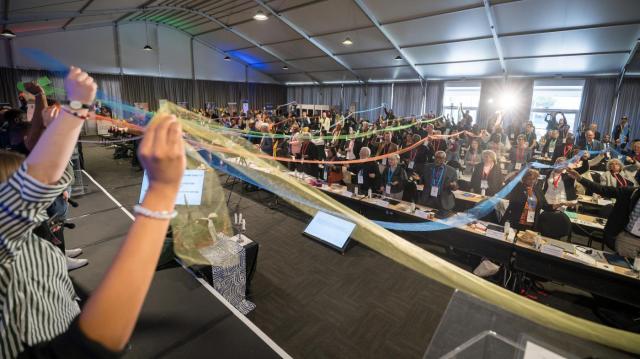Ecumenical leaders reflect on justice, unity, climate, and Palestine at the WCC Central Committee meeting in Johannesburg.

From June 18–24, 2025, church leaders from across the globe gathered in Johannesburg, South Africa for the World Council of Churches (WCC) Central Committee meeting. The event was grounded in the theme “Pilgrimage of Justice, Reconciliation, and Unity”—a journey that continues to shape the ecumenical movement in the face of deep injustice, ecological crisis, and armed conflict.
Just weeks earlier, Rev. Prof. Dr. Jerry Pillay, General Secretary of the WCC, brought greetings and reflection to The United Church of Canada’s Centennial Worship Service, affirming the long-standing ecumenical partnership and The United Church’s role in shaping global Christian witness.
The Rev. Prof. Dr. Jerry Pillay opened the gathering by urging churches to be bold in hope. “Christians are people of hope,” he said. “The ecumenical movement is a counter-cultural movement of hope.” Speaking in his home country, he reminded those gathered of the unity and courage that helped end apartheid in South Africa.
As a founding member of the WCC, The United Church of Canada shares in this global fellowship’s commitments. The Central Committee marked several key moments that reflect the values and work of our church, including:
- The launch of the Ecumenical Decade of Climate Justice Action, which calls for churches to move beyond charity toward systemic transformation. Indigenous voices from the Pacific, Africa, and the Americas called for bold, faith-rooted climate witness that centers those most affected.
- A powerful statement on Palestine and Israel, which names the realities of occupation and apartheid, and calls for divestment, sanctions, and accountability under international law. The statement affirms the distinctiveness of Jewish identity from state policy and denounces antisemitism, anti-Arab racism, and Islamophobia alike.
- The 40th anniversary of the Kairos South Africa document, a pivotal declaration against apartheid theology, reminding the church that prophetic witness often requires discomfort, courage, and clarity.
The gathering was both a lament and a call; a recognition that the world is in crisis. As many nation-states turn towards insular nationalism, churches are called not to retreat, but to engage globally and respond with faithful courage.
“Indeed, Jesus is our peace and hope,” said Pillay. “This is not only the message, but the gift we can offer the world.”
Learn More about the Work of Global Partnership
Would you like to accompany the Global Partnership Team on our journey of daring justice, bold ideas, and deep radical accompaniment? Follow United Action for Justice on Facebook and Instagram, and check out the newsletter.
The Global Partnership Program engages many partner organizations around the world that work in various areas, including economic justice, human rights, food security and sovereignty, militarism and violence, water rights, refugees and migration, climate change, and other interconnected issues.
If you’d like to hear more about global partnership work at community of faith events, services, and gatherings, let us know. Contact the Global Partnership Team at justice@united-church.ca.